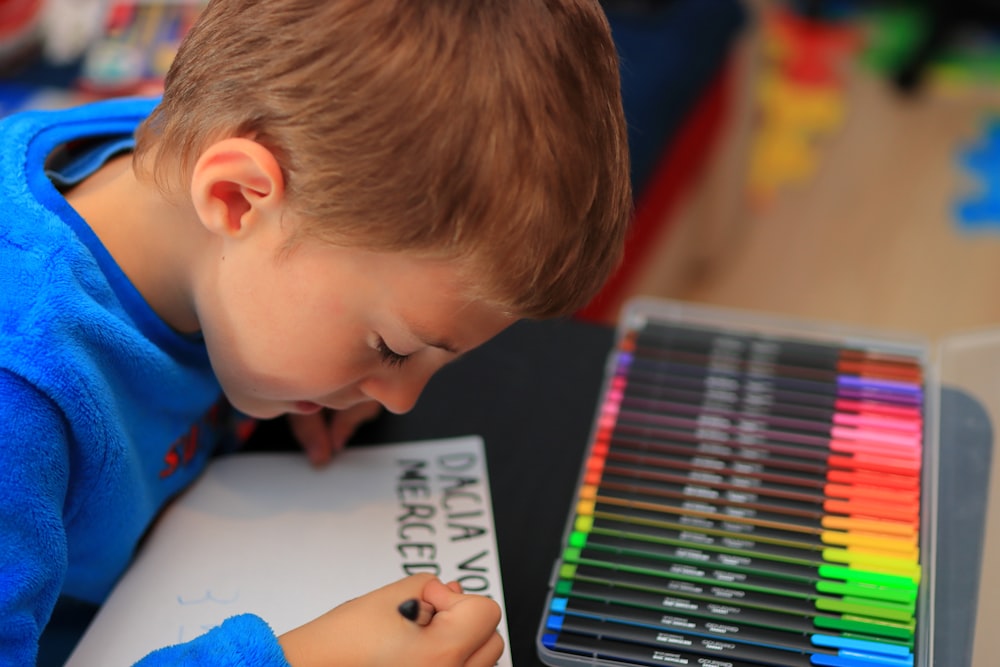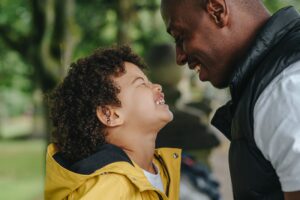Five-year-olds are a lot of fun! They’re out of the terrible twos and three-anger years; they’re more independent and interesting to talk to! A five-year-old has a strong sense of empathy and probably has a few close friends. They have opinions, lots of them, and they ask a lot of questions, which is exhausting but also inspiring!
Your Five-year-old is probably preparing for Kindergarten and “big kid school” and is ready for a host of new developmental milestones! Five-year-olds are officially kids. This may make you pause and wonder, “Where did your baby go?” But even as big as your kid may seem, they still need mom and dad, and they still have a lot of learning to do!
Five is a big year! A lot of changes happen, and your child’s personality will start to shine through. Here are five facts about your five-year-old to help prepare you for this momentous time!
1. 5.5 % of Five-Year-Olds are “Red-shirted”
Kindergarten isn’t what it used to be; in fact, they say preschool and pre-k are the new kindergarten. As a result, some kids, especially those with summer and early fall birthdays, might not be ready for kindergarten come September. And that’s OK! Academics are important, but not the most important thing a kid needs to enter Kindergarten. Your five-year-old needs to be emotionally and socially ready to learn. So, if they’re struggling or behind in the social-emotional element, consider keeping them in pre-K for an extra year. Boys are more likely than girls to stay back, but it all depends on the individual child.
I have a late August birthday, was already reading but had ADD, and couldn’t focus or sit still; in the 1980s, teachers didn’t know what to do with kids like me, and I was held back for a second year of Kindergarten. Now, I have two undergrad degrees and a master’s degree, and I run my own business; I turned out OK! I held back my eldest, who has a late spring birthday, for social-emotional reasons, and he is thriving now in middle school. My youngest, who also has a late spring birthday, even with ADHD, didn’t need the extra year. This is to say, every kid is different.
If you red-shirt your child when they are young, it is less likely to have a negative impact on them; they may not even remember! However, if your child enters school and struggles and ends up staying back later, it might cause more of an embarrassment. If you’re unsure if red-shirting is suitable for your child, talk with their preschool teacher pediatrician, and trust your gut!
2. Wetting the Bed at Night is Normal
Most five-year-olds will be fully day potty trained with no issues. However, it is perfectly normal if your five, six, seven, or eight-year-old wets the bed at night. Nighttime bed-wetting is not a behavioral issue; it is a physical developmental issue, and some children’s bodies develop slower than others. Bed-wetting at night might make your child feel embarrassed. Help them by telling them they’re not doing anything wrong and their body needs more time!
You can help your child by ensuring they use the bathroom right before bed, limiting liquids for two hours before bed, and using a waterproof mattress pad and pull-ups at night. Some older children may also like learning how to change their sheets themselves; teaching them how to change them develops independence and may lessen their embarrassment because they don’t need to wake you up or ask for help. However, changing the bedding should NEVER be done as a punishment for wetting the bed.
For more tips on aiding a child with nighttime bed wetting, check out this article from the Cleveland Health Clinic.
3. Their A t Starts to Look Realistic
By five, your child’s art will begin to resemble actual people, places, and things! People and animals will have bodies, heads, limbs, hands, and feet! When you look at your child’s drawings, you’ll get an idea of what they’re drawing. However, I always recommend asking your child to tell you about their picture instead of stating what you think it is; if you are wrong, you won’t affect their self-esteem.
Simple comments like, “Wow, this is so colorful; can you tell me about it?” get the ball rolling and encourage your child to talk and share their art. Avoid general statements like, “This is good” or “I like it.” Try to find something specific you can mention, such as colors, shapes, patterns, etc. A comment as basic as “You really used a lot of green!” shows your child you’re paying attention to their creation.
4. Five-Year-Olds Learn 9 New Words A Day!
A child’s vocabulary constantly expands; on average, your five-year-old will learn nine new words daily! You can stimulate that growth by using new and unfamiliar words when you speak to them. When children hear words used in context, they gain an understanding of what they mean. And if they hear it enough, they’ll begin trying it out when they speak. They won’t always get it right, but it’s cute to hear, and it’s how they learn.
Discuss anything and everything with your child! Look at pictures, talk about the weather, go for a walk, and discuss what you see, hear, smell, and feel. Ask your child open-ended questions to stimulate cognitive thinking and develop conversational skills.
Reading daily to children also expands their vocabulary. Most ki s in pre-k aren’t reading yet. They may recognize some sight words and be able to recite familiar passages from favorite stories, but the skill of sounding out new words probably hasn’t developed yet. And that’s OK! Some kids don’t read until they are ending first grade. However, the more they are read to and the more words they hear, the easier it is for them to learn reading.
5. They Can Write Their Name but Probably Not Read
As we mentioned in number four, most five-year-olds cannot read. Despite the pressures parents may feel from their peers, just because little Timmy is reading at five does not mean your child should! I always remind parents that every child develops differently. For example, I was reading at age three; however, I still (forty years later) count using my fingers half the time.
However, Your child should be able to correctly write their first and last name before entering kindergarten. Your child should also be able to recognize their names in various prints and clear handwriting. They will also likely know most, if not all, of their uppercase and lowercase letters. But it’s OK if they don’t have them all down pat by kindergarten. Your kid may also recognize other familiar names, store signs (my kids knew Target!), street signs, and perhaps a few sight words.
They should use the three-fingered pinscher grasp and clearly write most letters, even if they hold the pencil too close to one end. If your child needs practice writing, give them large lined paper and thicker pencils for practice. Tracing activities can also help develop hand and muscle control. Emerging writers will write letter strings and even mock words as they gain confidence. Provide your child with plenty of opportunities to write.
Parenting a five-year-old is a lot of fun. They can do more themselves, hold a conversation, and further develop their personality as they make friends, discover likes and dislikes, and perhaps even begin a sport or hobby! A five-year-old is fiercely independent, but they still love snuggles, bedtime stories, and hanging out with their parents. Take time to enjoy the ups and downs of having a five-year-old kid.
September 21, 2023, by L. Elizabeth Forry














